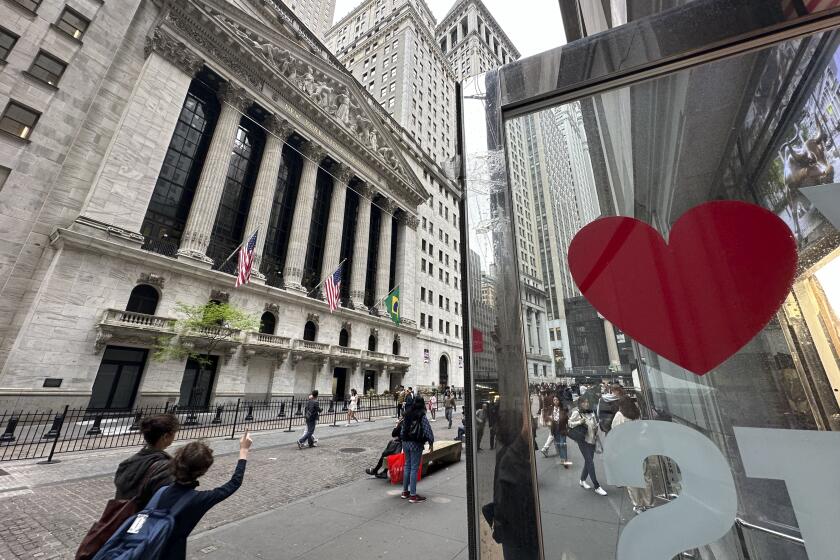Blue chips shrug off wholesale inflation report to post gains
U.S. blue-chip stocks pulled ahead Tuesday despite a report showing higher-than-expected inflation at the wholesale price level.
Technology issues remained under pressure, as software giant Oracle’s quarterly earnings disappointed investors.
In other trading, the dollar fell against the euro after a report showed that German business confidence surged unexpectedly this month.
Wall Street showed little reaction to a sell-off in many emerging markets that was triggered by the Thai government’s surprise decision Tuesday to put controls on foreign investment.
The government’s goal was to stop speculators from pushing up the value of the nation’s currency, the baht. The rising baht has been making Thai exports more expensive abroad.
But one side effect of the move was to drive investors out of the Thai stock market, which plummeted nearly 15%. Other emerging stock markets also fell sharply, clipping what for many has been another strong year of gains.
U.S. stocks may have benefited as some investors fled smaller markets.
The Dow Jones industrial average closed up 30.05 points, or 0.2%, to a record 12,471.32, lifting its year-to-date gain to 16.4%.
The Standard & Poor’s 500 index added 3.07 points, or 0.2%, to 1,425.55, shy of the six-year high it reached Friday.
Winners topped losers by about 5 to 4 on the New York Stock Exchange.
The inflation report, which showed wholesale prices up 2% last month, failed to rattle either blue-chip stocks or the bond market.
The 10-year Treasury note yield ended at 4.59%, up from 4.58% on Monday.
The report didn’t change the prevailing view about inflation, which is that it will moderate in 2007, allowing the Federal Reserve to hold short-term interest rates steady, analysts said.
“The long-standing view of a slower-growing economy going forward and price pressures that are contained [remains] fairly intact,” said Anthony Chan, chief economist at JP Morgan Private Client Services.
But growth concerns may be dogging the technology sector.
The tech-dominated Nasdaq composite index slid 6.02 points, or 0.2%, to 2,429.55.
Nasdaq was hurt as Oracle shares dropped 81 cents, or 4.5%, to $17.10, a three-month low. The company late Monday said quarterly profit rose 21%, but some investors focused on slowing sales growth in key product lines.
“Cracks appear to be showing in the Oracle organic growth story,” John McPeake, an analyst at Prudential Equity Group in New York, wrote in a note to clients.
In other trading, the euro jumped to $1.319 from $1.310 on Monday after a German business confidence index rose this month to its highest point since the nation was reunited in 1990, defying expectations of a decline and underscoring the strength of the economy’s upswing. That is bullish for the euro.
Gold, which often benefits from a slide in the dollar, got a lift. Near-term gold futures in New York rose $7.60 to $621.60 an ounce.
The metal’s advance pushed gold mining stocks higher. Barrick Gold rose 53 cents to $30.71 and Agnico Eagle rocketed $1.68 to $42.23.
Among the day’s market highlights:
* A rebound in oil prices gave energy stocks a boost. Exxon Mobil added $1.48 to $76.99. The stock is up 37% this year. Valero Energy rallied $1.12 to $54.45.
* Health-insurance providers attracted buyers. WellPoint rose $1.21 to $78.54 and Cigna jumped $1.82 to $131.58.
* Retailers were mixed after Circuit City reported a quarterly loss because of lower prices on TVs and computers. Circuit City tumbled $3.75 to $19.01 and rival Best Buy fell 79 cents to $48.55.
* Profit-taking clipped real estate investment trust shares, which have been among the biggest gainers on Wall Street this year. Boston Properties slid $1.67 to $112.58, Simon Property Group fell $1.28 to $98.69 and Macerich dropped $1.49 to $81.24.
* Among new stock issues, Melco PBL Entertainment soared $2.55 to $21.55 on its first day of trading. The company (ticker symbol: MPEL) plans to invest $3.3 billion over five years building three casino resorts and an apartment complex in the Chinese territory of Macao, the gambling center of Asia.






